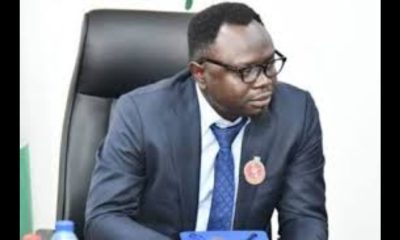NEWS
Agro Experts Equip Farmers in Kwara with Innovation, Risk Mgt Techniques

From Samuel James, Ilorin
The Agriculture experts in University of Ilorin have trained some farmers in the State on risk management by insurance and rural e-commerce, training which was funded by Feed The Future Innovation LAB For Markets, Risks and Resilience, the USAID and the International Centre for Evaluation and Development.
The training presentation entitled ‘End Line Dissemination Workshop for the Advance Local Leadership, Innovation and Networks (ALL-IN) delivered by Prof Opeyemi Ayinde, a Principal Investigator of the Feed the Future Programme. She explained that the training was to encourage farmers to build resilience using technology and financial innovation, saying there was a need for farmers to embrace the innovative farming techniques and the use of improved stress tolerant maize seeds.Prof Ayinde who is an expert in Agricultural Economics, emphasized that if such innovation was joined with financial inclusion like insurance, credit, financial literacy, it will help farmers in reducing risks farming in Nigeria.“Women farmers are not supposed to be neglected, as the result has shown that the male and female farmers, when presented with the same opportunity, are to make the farming community better off,” she said.In her remarks, Khadijat Amolegbe, also a researcher, said farmers can sell their products on the market far away from them, and they can even access international markets to sell their products.“The farmer will get better income from accessing data markets, while investing in their agricultural space leading to increased food production and food security.”In the welcome speech, Kwadwo Mensah, the Director of Research for the International Centre for Evaluation and Development highlighted that ALL-IN research projects were projects that looked at flipping the traditional model for research collaboration.He noted that local researchers were funded to carry out studies in Africa, by US researchers and added that the foreign based researchers lack the context and also the local understanding of what actually happens in the African continent.He then observed that the greatest challenges facing African farmers include market risks, resilience and innovation, while pointing out that if farmers had a fair idea about the market, how to promote their products and also understand issues of finances and climate, then they need to be resilient.The Vice Chancellor of University of Ilorin Prof Wahab Egbewole, a Professor of International Law who was represented by Prof Olubunmi Omotesho, a Deputy Vice Chancellor Academics also said the essence of the study was to ensure that farmers have direct access to the markets, as he opined that Agriculture is associated with risks, stressing that there was a need to mitigate those risks.Foreign News
Man Bites Off Part of Another Man’s Ear On Train

A fight on a German train saw a man bite off a piece of another man’s ear, police said on Monday.
The incident occurred on a Deutsche Bahn train between the south-western cities of Mannheim and Stuttgart.
An argument broke out after an unknown man accused a 43-year-old man of looking at his partner.
The former bit the ear of the 43-year-old, who retaliated by biting the man’s finger.
According to police, the unidentified man and his companion were able to leave the train at the central station in Stuttgart and fled.
Police said that they are searching for the man’s identity.
The 43-year-old was taken to the hospital, where the piece of his ear was sewn back on.
(dpa/NAN)(www.nannews.ng)Foreign News
Israeli strike hits hospital in Iran’s Kermanshah

A hospital in the western Iranian city of Kermanshah was reportedly struck by an Israeli airstrike, Iranian media said on Monday.
A video published by the newspaper Shargh showed a damaged intensive care unit, with blood-stained hospital beds visible in the footage.
An Israeli army spokesperson stated that the reports are under investigation.
Under international humanitarian law, hospitals are granted special protection as civilian facilities and may only be targeted if there is clear evidence they are being used for military purposes.
Israel says its military campaign inside Iran is now in its fourth day, aimed at thwarting the country’s nuclear and ballistic missile programs.
(dpa/NAN)NEWS
Midterm Appraisal of Akpabio-led Tenth Senate

When Godswill Obot Akpabio, Senator representing Akwa Ibom North-West District, was elected as the President of the 10th Senate on 13th June 2023, there were high expectations from his distinguished colleagues and the Nigerian public. The expectations were based on Akpabio’s glittering political resume and track record at the state and federal levels.
Two years later, the accomplishments of the Upper House under his leadership justified his election and validated the expectations.
Stability in the Senate
An appraisal like this takes into account both tangible and intangible indicators. Watchers of parliament know that the Presiding Officer is just first among equals and serves at the pleasure of members.
Therefore, the role requires great political sagacity and astuteness to perform.Because the politics in a vibrant Parliament is rather unpredictable, stability becomes a priority in the hallow chamber since nothing can be achieved under chaos.
The 10th Senate has been politically stable and united in the past two years despite the occasional tension and distractions typical of a democratic setting.
The distractions became occasions for Akpabio to demonstrate his tremendous leadership capacity, tolerance, diplomacy and courage.
Recall when an allegation arose that the 2024 budget had been padded with N3.7 trillion, representing more than 10 percent of the entire budget of N28.78 trillion. Akpabio ensured that the allegation was addressed transparently in the full glare of live television. After an exhaustive debate during which the allegation could not be substantiated, the Senate decided to suspend the author of the allegation, Senator Abdul Ningi (PDP-Bauchi) for three months for “violations of legislative rules, allegations of misconduct and unethical behaviour for the interview he granted on BBC media on the 2024 Appropriation Act.”
Another case is that of Senator Natasha Akpoti-Oduaghan(PDP-Kogi), who was suspended for six months for “total violation of the Senate Standing Rules and for bringing the Presiding Officer and entire Nigerian Senate to public opprobrium.”
Despite those incidents, Akpabio has retained the trust of his colleague-Senators and sustained the cohesion of the multi-party Assembly. It is noteworthy that the 10th Senate, on three occasions, passed a Vote of Confidence in Akpabio’s leadership. This showed that those distractions were properly managed.
There have been changes in the composition of the Body of Principal Officers, but the changes were not on account of internal crises in the Red Chamber. Barely four months after the inauguration of the 10th Senate, Senator Oyelola Ashiru (APC-Kwara) was elevated from his post of Deputy Chief Whip to replace Senator David Umahi (APC-Ebonyi) as Deputy Leader of the Senate. Senator Umahi exited the Senate to take up an appointment as Minister of Works.
Senator Onyekachi Nwebonyi(APC-Ebonyi) was consequently made the Deputy Chief Whip. That was in October 2023. By the following month, November, Senator Abba Moro ( PDP-Benue) replaced Senator Simon Nwadkwon (PDP-Plateau) as Minority Leader, while Senator Osita Ngwu (PDP-Enugu) replaced Senator Darlington Nwokocha (Labour Party-Abia) as Minority Whip. Both Nwadkwon and Nwokocha were sacked from the Senate by the Court of Appeal.
In July 2024, the Senate removed Senator Ali Ndume (APC-Borno) as Senate Chief Whip, acting on the directive of his party, the All Progressives Congress (APC). He was replaced by Senator Mohammed Tahir Monguno (APC-Borno).
Akpabio’s leadership has ensured the red chamber is stable and conducts proceedings to produce optimal results from its statutory functions.
Legislature/Executive Relationship
The 10th Senate and the 10th National Assembly, under the Chairmanship of Godswill Akpabio, have maintained an excellent relationship with the other arms of government, particularly the Executive. The collaboration with the Executive has been seized by the usual critics to mock the 10th Assembly as a “rubber stamp” of the Executive. But Akpabio’s leadership team has remained focused on the ultimate goal of providing good governance through productive synergy with the Executive.
Legacy Achievements
The stability within the parliament and cordial relationship with the Executive through collaboration have yielded good fruits through the passage of legislation and motions that impact the lives of Nigerians.
Nigerians across the political divide lauded the Local Government Financial Autonomy Act, which grants local governments greater control of their resources, laws establishing Regional Development Commissions to drive development initiatives concerning economic, social and infrastructural development in each of the six geopolitical regions in the country and the National Minimum Wage ( Amendment) Act, 2024 which raises the minimum wage from 30,000 naira to 70,000 naira.
There is also the Students Loans (Access to Higher Education) (Repeal and Re-enactment)Act, 2024, which establishes the Nigerian Education Loan Fund (NELFUND) to grant students zero-interest loans for higher education and the Nigerian tax reform legislation, which comprises the Nigeria Tax Bill, Nigeria Tax Administration Bill, Joint Revenue Board (Establishment) Bill, and the Nigeria Revenue Service (Establishment) Bill.
The overall objectives of the Tax Reform bills are to stimulate economic growth, improve tax compliance and foster a more equitable tax system.
The 10th Senate has considered and passed many establishment bills for universities and other tertiary and agricultural Institutions across the country.
These are just a few. In all, the 10th Senate, within two years, introduced 844 bills, out of which 107 are now at the committee stage while 206 are awaiting first reading. A total of 409 bills are at the second reading stage, while the Upper House has passed 96 bills, out of which 56 have been signed into law by the President.
The Senate has already indicated that, in the second half of 2025, it will prioritise the review of the 1999 Constitution for which a 47-member Constitution review/amendment panel headed by the Deputy Senate President, Barau Jibrin, has been set up. Nigerians can look forward to fundamental constitutional reforms that will touch on the creation of a State Police, greater women’s inclusion in governance through the provision of special seats in parliament and comprehensive electoral reforms.
Oversight/Security
The 10th Senate takes very seriously its oversight function. Its various committees have been reaching out to government Ministries, Departments and Agencies(MDAs) under their respective jurisdiction.
To further underscore its concerns about the state of security in the country, besides the several interactions with the Security Chiefs and increased budgetary allocation, the Senate in May, took a step further by setting up a special panel headed by the Senate Leader, Opeyemi Bamidele, to convoke a National Summit on security aimed at finding a way out of the rampant killings in the country.
Akpabio’s Senate Presidency is delivering on governance and with the continued support of his distinguished colleagues, more legacy achievements abound to the credit of the 10th Senate and the 10th National Assembly in general.
***Awoniyi, media aide to Senate President, writes from Abuja



















